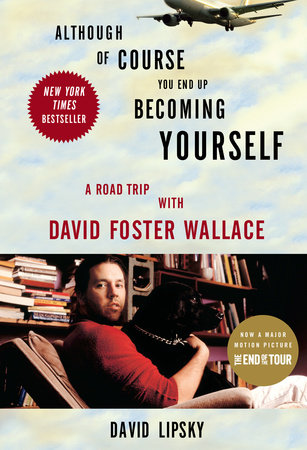If writing had a logo, it’d be the anchor, the quicksand easy chair, but from the minute I shook David’s hand we didn’t stop. We hit his class, then rolled into the car keys, sodas, strangers, and hotel rooms of a road-trip movie. Airports and taxis and the eerie sensation of knowing your feet have stood in different cities in the morning and afternoon.
This introduction is the Commentary track—which nobody goes in for until they’ve loved the DVD—so I’d recommend a quick select back to Main Menu and Play Movie. The road trip was the end of David Foster Wallace’s Infinite Jest book tour, when, as a reporter, I asked and he told me the story of his life. David had a caffeine social gift: He was charmingly, vividly, overwhelmingly awake—he acted on other people like a slug of coffee—so they’re the five most sleepless days I ever spent with anyone. (The last day, we crossed three states by air, shot down another 140 miles of highway, and I thought it was still midnight. “That’s what your watch says?” David snorted. “It’s two twenty, dickbrain.”) Then it was over, and we were standing still again, and it was hard and sad to leave. And you’ll see me trying to cook up reporting jobs in order to hang around.
It has the feel of a highway conversation. Late at night, the only car in the world, on icy morning roads, yelling at the other drivers. It has the rhythms of the road: grouchiness, indefensible meals, and the sudden, front-seat connections—reciting high points from mo ies, the right song and a good view sending the radio into soundtrack, a statement that gives you the bright, runway lift of knowing that another person has experienced life the way you do—that are the stuff you go on trips for.
When you skip ahead, you should know it’s early afternoon, March 5, 1996. The air has the gray, erased-blackboard quality of weather tightening itself for a storm. David has just stepped out of his little brick one-story house. He has his hands in his jean pockets, his two black dogs are running thrilled tours of greet and patrol. He’s wearing round glasses. The look beneath them says two more or less clear words: now this. I’ve got some treasured beliefs about my own emotional tone. I’d like to think it’s grittily complex, penetrating, understanding, and deeply individual. It’s pretty obviously: please be impressed by me. At our first big conversation—our first stunning meal: Chicago-style pizza, the cheese mound and topping landslide—he’ll tell me he wants to do a profile of the reporters who’ve come stamping through, doing profiles about him. “It’d be a way for me to get some of the control back,” he’ll say. “Because if you wanted—I mean, you’re gonna be able to shape this essentially how you want. And that to me is extremely disturbing.” It would have been one of the deluxe internal surveys he specialized in—the unedited camera, the feed before the director in the van starts making cuts and choices. The comedy of a brain so big, careful, and kind it keeps tripping over its own lumps. That’s what this book would like to be. It’s the one way of writing about him I don’t think David would have hated.
So it’s two in the afternoon. I’ve just dropped my bag on his living room carpet, which is a mess, but the mess feels hospital cornered, curated. (Whatever reassurance and encouragement the decorations give him is going to be tagged and sifted, for what it might explain publicly.) We’ve addressed the two women’s magazines on his counter. (David is a Cosmopolitan subscriber; he says reading “I’ve Cheated—Should I Tell?” a bunch of times a year is “fundamentally soothing to the nervous system.”) I’ve also been surprised to find the towel of Barney, the purple dinosaur and befriender of children, subbing as a curtain in his bedroom, and the big poster of complaint singer Alanis Morissette on his wall. I’ve just unpeeled and loaded a Maxell cassette into my recorder. Always a pleasant, blameless moment to the journalist; a round in the chamber, boots polished, reporting for duty. I got up at five this morning, hailed a cab at the New York hour when the city is still drifting through sleep, the streets rolling over and steam drizzling upward out of the manholes. Then I flew two hours to Chicago, signed and initialed for the rental car, drove another two here: If you were putting us in a comic book panel, you’d draw motion lines coming off my body. And there’d be black scrunches over David’s head. He’s been touring for two weeks, reading, signing, promoting. He’s walking toward me over the clumps and vines of unsorted travel memories, signaling from behind the hurricane fence of someone who’s become bewilderingly famous.
I’m thirty years old, he’s thirty-four. We both have long hair. I’ve just placed the tape recorder on top of his magazines. He’s made a request. What with all the travel, he’d like the right to retract anything that might come off awkward or nasty. (He’s about to say a hundred unbelievably honest, personal things. The one place he’ll get cold feet is where he feels he’s been a little uncharitable to poetry. The form will touch readers again once it focuses on nine-to-five and couples who spend a marriage in the same bed. The verb he used was meatier.) Otherwise, this book runs from the minute I turn on the recorder, through five days of diners, arguments, on-ramps, friends, a reading, a faraway mall, his dogs, up to the last word David said to me. It’s a word that meant a great, complicated amount to him. After he died, I read through this week again. I was surprised and moved—it seemed very much like him—to see that he used it in the context of a dance.
* * * *
David’s class
Class: “advanced prose”
[Doesn’t want a tape. Is comfortable with note-taking.]
Fluorescents, desks, steel wastepaper cans, boot smell, sweater smell, clock on wall, big table that David doesn’t sit much behind. Fifteen students. Women sit, as at an old-line synagogue, slightly apart from men. David wearing Fryes, blue bandanna. Carrying Diet Pepsi.
Dave has noticed some surprising student errors this week.
Dave: Before we start, let’s do a moment of Grammar Rock.
They laugh. He’s the ideal, the professor you hope for: lightning writer, modern references, charming and funny and firm.
The students know another thing: he’s become, their bandanna-wearing teacher, during these past three weeks a suddenly celebrated man. And they want somehow to acknowledge it.
Student 1: Done being famous yet?
Dave: (Blush smile) Two more minutes.
Kid from back, suddenly: I knew him well, Horatio—a man of Infinite Jest . . .
Dave: OK, you’re allowed one reference.
Quick chatter about his media appearances. It’s exciting; a piece of their private life—this room and class—has gone suddenly public.
Student 2, female: I love the way the Trib described your office.
Student 3, female: Did you wind up, like, next to Dick Vitale and Hillary Clinton?
Dave says he got real nervous on the flights, kept picturing grave etc., from tour.
Student 4: Just put pepperoni and mushrooms on my Tombstone. (A take-out, grocery pizza sort of joke.)
Dave: The words “pop quiz” is what’s good about that.
They talk about his magazine photos. Dave blushes more.
Dave: I didn’t think, I didn’t think—you can see my smiling maw. I thought, “Really? Is that me?”
Dave fishes out a Styrofoam cup after pawing through two wastebaskets, for someplace to put his chewing tobacco. Is also drinking a Diet Pepsi.
Class begins with a jump from celebrity into the supernormal, the administrative.
Dave: Office hours next week. Bring light reading material, if you have to wait in the hallway.
Begins work on student stories.
Dave: (Offering Very Sensible advice. Lots of jobs for fiction, you have to keep track of twelve different things—characters, plot, sound, speed.) But the job of the first eight pages is not to have the reader want to throw the book at the wall, during the first eight pages.
He paces around the classroom. Happy, energetic. At one point, thinking, he even drops into a quick knee bend. Class laughs; they really like him.
Dave: I know—I get real excited, and now I’m squatting.
First story: by pretty student with a Rosanna Arquette mouth. Dave on story, always using TV: “I submit, it’s kinda like a Sam and Diane thing. Or When Harry Met Sally.”
Classroom fluorescents flicker on and off, quiet flashes. Dave glances up.
Another story he likes: it’s very open, but needs to be controlled. “This is just a head kinda vomiting at us . . .”
Less likable story: “This is just a campus romance story. And to the average civilian, I’ve gotta tell you, this is not that interesting . . .”
Now at desk. Craning up and down when discussion and story get him excited.
The student being workshopped is a punkish guy: mohawk, silver-and-yellow collar.
Dave: It’s really hard to create a narrator who’s alive. Take it from me.
Students: How?
Dave’s advice is a kind of comedy, and makes them laugh.
Dave: To have the narrator be funny and smart, have him say funny, smart things some of the time.
He makes a flub, says quickly, “Brain fart.” He stops for a second. Holds steady. “Excuse me, I’m about to burp.”
His delivery is darting and graceful: the Astaire quality of good teaching.
On the campus romance story. “The great dread of creative writing professors: ‘Their eyes met over the keg . . . ’”
The key to writing is learning to differentiate private interest from public entertainment. One aid is, you’re supposed to get less self-interested as you age. But, “I think I am more self-absorbed at thirty-four than twenty-three. Because if it’s interesting to me, I automatically imagine it’s interesting to you. I could spend a half hour telling you about my trip to the store, but that might not be as interesting to you as it is to me.”
Reminds the class, as it breaks. Notebooks closing, bookbags rising from floor to desktop. Ruckle noises, kids standing. The week’s two lessons.
Dave: Never—don’t go there: “Their eyes met across the keg . . . ” And “What’s interesting to me may not be to you.”
Still in good, buzzed-up mood after. Brings me a water to drink.
Dave: Where would you be without me?
I hope it’s not that same tobacco-Styrofoam cup.
From ALTHOUGH OF COURSE YOU END UP BECOMING YOURSELF. Used with permission from Broadway Books. Copyright © 2010 by David Lipsky.













